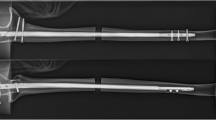Abstract
Introduction: With the exception of forearm fractures, intramedullary techniques are preferred for osteosynthesis in the case of long-bone fractures. For the latter, however, the main problem remains insufficient stability against torsional forces resulting in high rates of non-union. This is why plate osteosynthesis by means of a DCP 3.5 or LC-DCP 3.5 is still being described as the standard procedure. Materials and methods: In a prospective study, 32 patients (33 forearms) with fractures of one or both forearm bones were treated by implantation of 40 intramedullary ForeSight™ nails (ulna: 23; radius: 17). Clinical and radiographic follow-up was performed at 6, 12, 26, and—if needed—52 weeks postoperatively. Time to follow-up was 31.4 months on average (range 24–44 months). Results: The average time to fracture healing for 36 fractures of 29 patients was 4.4 months. A free range of motion was seen in 86%, and only four forearms had a loss of pronation and supination. DASH score averaged at 13.7. There were few complications: non-union 1, delayed union 2, radioulnar synostosis 2, and infections 0. No refracture was seen after 19 implant removals so far. Average time needed per operation was 67 min, average time for fluoroscopy was 4.4 min. Conclusion: This intramedullary nail can do justice to the specific anatomical needs in the case of the forearm. Static interlocking guarantees adequate stability in all fracture types. The surgical technique is demanding. Nonetheless, this system can yield results of comparable quality to those of plate osteosynthesis. So far, no refractures after removal of the implants and no complications connected with the actual implants have been observed.





Similar content being viewed by others
References
Bauer G, Arand M, Mutschler W (1991) Post-traumatic radioulnar synostosis after forearm fracture osteosynthesis. Arch Orthop Trauma Surg 110:142–145
Bednar DA, Grandwilewski W (1991) Complications of forearm-plate removal. Can J Surg 35:428–431
Chapman MW, Gordon JE, Zissimos AG (1989) Compression-plate fixation of acute fractures of the diaphyses of the radius and ulna. J Bone Joint Surg (Am) 71:159–169
Deluca PA, Lindsey RW, Ruwe PA (1988) Refracture of bones of the forearm after the removal of compression plates. J Bone Joint Surg (Am) 70:1372–1376
DePedro JA, Garcia-Navarrete F, Garcia De Lucas F, Otero R, Oteo A, Lopez-Duran-Stern L (1990) Internal fixation of ulnar fractures by locking nail. Clin Orthop 283:81–85
Gustilo RB, Gruniger RP, Davis T (1987) Classification of type III (severe) open fractures relative to treatment and results. Orthopaedics 10:1781–1788
Hertel R, Pisan M, Lambert S, Ballmer FT (1996) Plate osteosynthesis of diaphyseal fractures of the radius and ulna. Injury 27:545–548
Hidaka S, Gustilo RB (1984) Refracture of bones of the forearm after plate removal. J Bone Joint Surg (Am) 66:1241–1243
Hudak PL, Amadio PC, Bombardier C, The Upper Extremity Collaborative group (UECG) (1996) Development of an upper extremity outcome measure: the DASH (Disabilities of the Arm, Shoulder, and Hand). Am J Ind Med 29:602–608
Jones DJ, Henley MB, Schemitsch EH, Tencer AF (1995) A biomechanical comparison of two methods of fixation of fractures of the forearm. J Orthop Trauma 9:198–206
Krettek C, Schandelmaier P, Tscherne H (1997) Neue Entwicklungen bei der Stabilisierung dia- und metaphysärer Frakturen der langen Röhrenknochen. Orthopäde 26:408–421
Labosky DA, Cermak MB, Waggy CA (1990) Forearm fracture plates: to remove or not to remove. J Hand Surg 15:294–301
Matthews LS, Kaufer H, Garver DF, Sonstegard DA (1982) The effect on supination-pronation of angular malalignment of fractures of both bones of the forearm. J Bone Joint Surg (Am) 64:14–17
McAuliffe JA (1997) Forearm fixation. Hand Clin 13:689–701
Mih AD, Coone WP, Idler RS, Lewallen DG (1994) Long-term follow-up of forearm bone diaphyseal plating. Clin Orthop 299:256–258
Müller ME, Allgöwer M, Schneider R, Willenegger H (1991) Manual of internal fixation. Springer, Berlin Heidelberg New York
Oestern HJ, Tscherne H (1983) Ergebnisse der AO-Sammelstudie über Unterarmschaftfrakturen. Unfallchirurg 86:136–146
Rosson JW, Shearer JR (1991) Refracture after the removal of plates from the forearm. An avoidable complication. J Bone Joint Surg (Br) 73:415–417
Rumball K, Finnegan M (1990) Refractures after forearm plate removal. J Orthop Trauma 4:124–129
Schemitsch EH, Jones D, Henley MB, Tencer AF (1995) A comparison of malreduction after plate and intramedullary nail fixation of forearm fractures. J Orthop Trauma 9:8–16
Schöne G (1913) Zur Behandlung von Vorderarmfrakturen mit Bolzung. Münch Med Wochenschr 60:2327–2328
Street DM (1986) Intramedullary forearm nailing. Clin Orthop 212:219–230
Tabor OB, Bosse MJ, Sims SH, Kellam JF (1995) Iatrogenic posterior interosseous nerve injury: is transosseous static locked nailing of the radius feasible? J Orthop Trauma 9:427–429
Winckler S, Brug E, Baranowski D (1991) Bündelnagelung bei Unterarmfrakturen. Indikation und Ergebnisse. Unfallchirurg 94:335–341
Author information
Authors and Affiliations
Corresponding author
Rights and permissions
About this article
Cite this article
Weckbach, A., Blattert, T.R. & Weißer, C. Interlocking nailing of forearm fractures. Arch Orthop Trauma Surg 126, 309–315 (2006). https://doi.org/10.1007/s00402-006-0122-9
Received:
Published:
Issue Date:
DOI: https://doi.org/10.1007/s00402-006-0122-9




